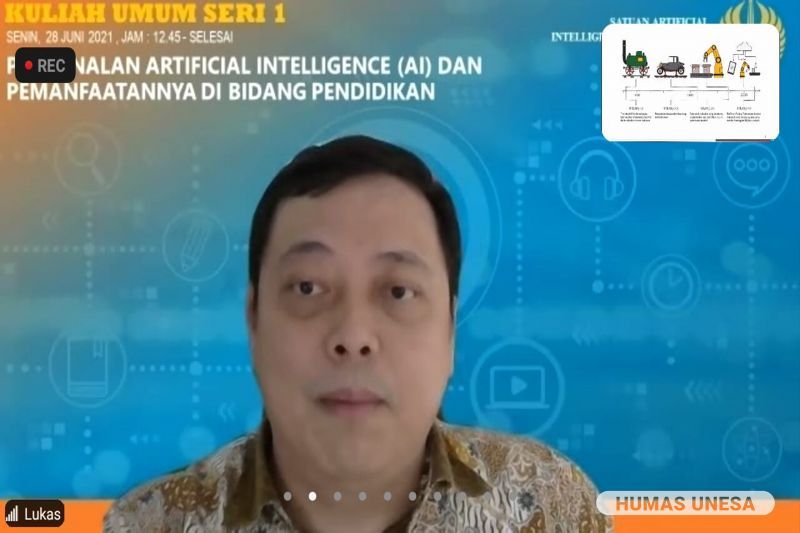
www.unesa.ac.id
Unesa.ac.id, Surabaya-The UNESA Artificial Intelligence and Scientific Publication Unit (AIPI) held the first series of public lectures with the theme "Introduction to Artificial Intelligence (AI) and its Use in Education" on Monday (28/6/2021).
Prof. Dr. Bambang Yulianto, M.Pd Deputy Chancellor for Academic Affairs UNESA in his speech said that in this era of the industrial revolution 4.0, Artificial Intelligence is no longer a foreign thing and is a daily understanding. Therefore, since two years ago, UNESA designed two compulsory institutional courses for all students.
The MK in question is Digital Literacy with the aim of equipping students with the basics of understanding in the use of technology and about big data. Not only for students who are struggling in the IT field, but also students as a whole.
As a counterbalance to the Constitutional Court, UNESA also established Physical Education and Fitness as a mandatory institutional Constitutional Court. "We hope that the balance between the ability to basic technology and health and physical fitness can form our students and alumni who have a healthy spirit and body, are active in moving and working and have the ability to use technology," he said.
He added that UNESA did start from a LPTK, but also continued to transform as a basis for developing pure sciences like other big campuses. Currently, he continued, the development of AI is indeed very basic and enters all lines of life. In this regard, he welcomed the event initiated by AIPI UNESA by presenting competent figures in this field.
"I believe this is a positive effort and an important milestone for the development of AIPI UNESA in the future," he said. "We, the leadership of UNESA, are proud of this division (AIPI UNESA, ed) because apparently among the 12 LPTKN in Indonesia, only UNESA officially and legally has an artificial intelligence unit," he continued.
Chairman of the Indonesia Artificial Intelligence Society (IAIS) Dr. Ir. Lukas, MAI, CISA, IPM explained that in general AI as a theory and the development of computers usually do tasks that are done by humans.
Currently, AI development is at the Artificial Narrow Intelligence (ANI) stage where AI performs a specific focused task, without the ability to develop its own functionality. The implication is that it can outperform humans in certain functions, such as driving, medical diagnosis, and financial technology.
The next stage of development is Artificial General Intelligence (AGI) which will take place around 2040. At this stage, AI is able to perform broad tasks, has reasons, and levels of ability that are comparable to humans. The implication is that AI competes with humans.
Then AI progressed to the Artificial Super Intelligence (ASI) stage which occurred some time after the AGI stage. At this stage, AI shows intelligence beyond human capabilities. "The impact can help humans achieve social goals and can also threaten humanity," said the Atma Jaya University lecturer.
Meanwhile Dr. Intan Nurma Yulita, M.T, Head of the Research Center for Artificial Intelligence and Big Data at Padjadjaran University, said that the implementation of AI in education can take various forms. For example, during the Covid-19 pandemic, which requires studying and taking exams online. "Well, AI can be used to detect exam cheating through a fraud detection methodology with feature extraction," he said.
Head of the UNESA Artificial Intelligence and Scientific Publication Unit, Dr. Elly Matul Imah, M. Kom added, neurocognition in the use of AI refers to the process of connecting and assessing information, and includes the cognitive domain. Neurocognition includes cognitive in the literature such as processing speed, memory, attention, and other specialized functions.
While social cognition refers to mental operations based on social interactions such as perception, interpretation, and generation of responses to the intentions, dispositions, and behaviors of others. He continued that some of the AI's are in the form of biometrics that can be used for facial recognition, and identifying someone based on ECG Signal.
In addition, in the field of social behavior, AI can classify and detect hate speech and violence in the public sphere. While in neuro cognitive, AI can analyze student learning processes, mental workload, and detect neuro psychology disorders. (Madina)
Share It On:






